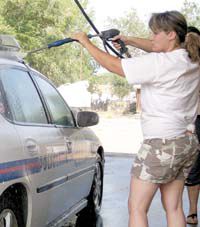| Sheri Wilson washes a Wellington Police Car during the drug courts bi-monthly community service project. The court members are required to commit four to five hours of service to their community every two months. The participants are also required to develop a community service project on their own before their graduation from the court. |
An estimated 23 million Americans struggle with a drug or alcohol problem, according to the National Substance Abuse Council.
In Carbon County, a cooperative team consisting of Four Corners Behavioral Health, the Carbon County Felony Drug Court and various 12-step and youth programs, including drug abuse resistance education, are providing assistance for the individuals who are seeking help.
September is National Recovery Month. The event will be celebrated with speakers, food, games and activities at the Price Peace Gardens on Sept. 21 at 5 p.m.
“This is the fourth year we have celebrated National Recovery Month here in Price. And what we want to let everyone know is – we do recover.” said Nanette Orton, a substance abuse counselor at Four Corners. “Those with substance abuse problems do go on to lead healthy productive lives if they seek and participate in recovery.”
Information from the National Substance Abuse Council’s 2007 report details the destructive affect that substance abuse can have on individuals and their families.
According to the report, the effects of substance abuse are cumulative, contributing to costly social physical, mental and public health problems.
The problems include teenage pregnancy, HIV/AIDS, sexually transmitted diseases, domestic violence, child abuse, motor vehicle crashes, physical fights, crime, homicide and suicide.
Eighty-five percent of persons with substance abuse problems did not feel that they needed treatment, according to the report.
In addition, an estimated 1.2 million people felt that they needed treatment, but did not get it.
Of the individuals in question, 441,000 reported that they made an effort to get treatment and were unable to locate or obtain it.
“Getting people to voluntarily submit to treatment can be very difficult,” said Kaylum Paletta, a substance abuse counselor at Four Corners. “Recovery from substance abuse is something that requires effort, you only get out of a recovery program what you put into it.”
For the individuals who are mandated by a judge to participate in a recovery program, local residents who qualify are eligible for the Carbon County Felony Drug Court.
“We have seen significant success within the court,” said Paletta. “Its long-term nature gives the participants time to adjust to a substance free lifestyle. The program does far more than detox someone from drugs, it prepares them to live a clean, drug free life.”
The drug court requires participants to work full time or go to school full time while paying their own way through the court and attending all required meetings.
“It’s not an easy program,” said drug court tracker Melanie Madill. “It really forces a person to change their whole life and it is our hope that once the participants see their potential, they will grab hold of the opportunity and flourish.”
Participation lasts for two years and members are required to attend weekly court meetings as well as Four Corner’s intensive Outpatient Program as they begin their journey into recovery.
“The program is very intense in the beginning and then gets less restrictive as the participants move through the phases and get closer to living without court supervision,” explained Madill. “Something important to note, is this program is completely volunteer. I believe that helps with our success, those within this program really want help because they have chosen to get help for themselves.”
The program is an option for criminal defendants who have felony drug charges and would prefer recovery to incarceration.
“This program isn’t a get out of jail free card, however,” said Madill.
The court uses sanctions, including jail sentences for those who break court rules. Additionally if a participant is unable to adapt to the courts requirements they can be removed from the program and face the penalty for their original charges.
According to Madill, most sanctions handed out by drug court administrator Judge George Harmond occur because participants do not complete the program requirements, not because they have relapsed.Examples include failing to attend a specific number of 12-step meetings per week, not because they have relapsed or used
“We have had 10 graduates from the program as opposed to three removals and as far as substance abuse goes that is a great average,” said Madill. “Everyone who is currently in the court is really looking forward to the recovery month celebration.”
Speaking at the event will be Judge Harmond, Four Corners administrator Jan Bodily, law enforcement officials and members of the recovery community.
As part of the court members giving back to the community, court staff has instituted a monthly public service project for participants. The first event took place on Sept. 9 and consisted of court members washing service vehicles for local law enforcement.
“It is important for members to take ownership within their community and give something back,” said Paletta. “I think we have proceeded to a really good phase in the court’s progression. The proceedings are starting to reflect the needs of the participants and that is directly related to the professionalism and dedication of the court staff. I would hope everyone in the community can come out and see the change the recovery community has made to the community in general.”

